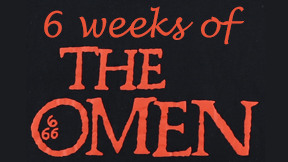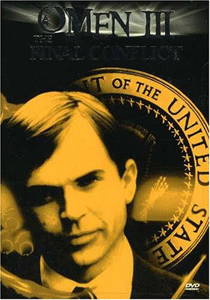Richard Donner returns as a producer and helps shepherd the original “Omen” trilogy to a stylish end in “The Final Conflict” (sometimes called “Omen III: The Final Conflict”) (1981). The religious settings – including a couple of striking churchyards – and vibe (via Jerry Goldsmith’s score) are delicious.
Solid religious horror
In this way, director Graham Baker gets a little closer to the 1976 masterpiece than did the first sequel, 1978’s “Damien: Omen II.” The screenplay by Andrew Birkin is straightforward: Damien (Sam Neill) continues to kill threatening people “Final Destination”-style with his mind. In an odd sign of maturity, his killings are classier now: a mauling by a pack of dogs as opposed to a squishing between train cars.
Following his adoptive father’s footsteps as both the head of Thorn Industries and the U.S. ambassador to the U.K. (don’t worry about any conflict of interest, his buddy the president says), Damien is secretly following his true father’s footsteps too. Between films and without explanation, he has developed a large cadre of disciples.

“The Final Conflict” (1981)
Director: Graham Baker
Writer: Andrew Birkin
Stars: Sam Neill, Rossano Brazzi, Don Gordon
Over six Tuesdays, RFMC is looking back at five films and one TV series in the “Omen” franchise.
As per prophecy, Christ has risen in the form of a child born on a certain day in London. So Damien has his followers kill these babies. But as the reborn Christ continues to live, Damien is in danger of weakening.
The events are what you’d expect, but “The Final Conflict” is pretty good religious horror all the same. But I couldn’t get past the continuity problem that’s the elephant in the room. This puts me in the minority, judging by a quick search of the internet.
He matures quickly
Damien was born in 1971 (as mentioned in the first film), and he’s 32 in 1981. There’s no mention of supernaturally fast aging; every reference indicates that he has aged normally. This film takes place in 1981 as per references to a star alignment on a certain date, and as per Damien’s interest in running for vice president in 1984.
“The Omen” takes place in 1976 as per Damien being 5, and having been born in 1971. “Damien: Omen II” takes place when he’s 13, so that would make it 1984, although there’s no reference to the year in that film.
The first two films feature 1970s vehicles, fashions and hairstyles. So the first definitely takes place in 1976, and the second can passably be in 1984. No attempt is made to set the third film in the future of 2003, and the references to the early ’80s confirm that it is not.

Long story short: Damien is born in 1971, he’s 5 in 1976, he’s 13 in 1978 (when he should be 7) and he’s 32 in 1981 (when he should be 10).
The filmmakers don’t care, and they decided viewers won’t care either. They seem to be correct. This is one of those “no one cares” phenomena, where people know it makes no sense but have collectively decided to overlook it.
Standout Sam
Neill (“Jurassic Park”) is great in “The Final Conflict,” totally charming but with hints that he’s the most evil being on the planet. This performance deserves credit alongside Anthony Perkins, Anthony Hopkins, etc., in rankings of main-character bad guys – not as high, certainly, but in the conversation. A great line sums up Damien’s demeanor and worldview:
“Most people confuse evil with their own trivial lusts and perversions. Now, true evil is as pure as innocence.”
Damien says this to newscaster and girlfriend Kate (Lisa Harrow). We understand why she’s charmed; except for his brutal behind-closed-doors dealings and mind-killings, Damien is a smooth-as-silk politician – and possibly one of the least bad ones.
Sure, he is turning Kate’s son Peter (Barnaby Holm) into a disciple – wiping blood on his cheek after a fox hunt (as one does) — but this looks identical to him being a good potential stepfather.
Timeless … in a bad way
Other characters are less memorable. Lead priest DeCarlo (Rossano Brazzi) has an old Italian accent that speaks to the Good vs. Evil stakes. But there’s a whole group of fighters-for-Christ who rather pathetically fail to kill Damien throughout the film.
The situation of Damien’s assistant, Dean (Don Gordon), is amusing. As per old-school fathering (I suppose), he’s barely interested in the fact that his wife just gave birth. But he becomes concerned when Damien seems to be targeting the boy as one of the potential reborn Christs. This leads to what qualifies as a twist in the otherwise paint-by-numbers narrative.
Ultimately, you’ll remember Neill’s performance, the imagery and Goldsmith’s score – whereas the first film has a richer mystery and serious personal stakes. In “The Final Conflict,” the fate of the natural world hangs in the balance between good and evil.
But is it the world of 1981, the world of 2003, or a world on another plane of reality? It doesn’t matter to the filmmakers. And, subconsciously at least, that’s why it doesn’t matter to most viewers.

